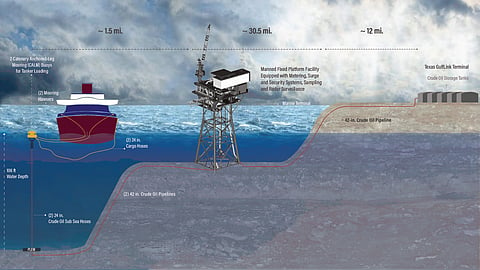

The US environmental regulator on Monday said it had issued an air permit for oil transportation and storage company Sentinel Midstream's proposed deepwater oil export project off the Texas coast.
The Environmental Protection Agency issued the Clean Air Act permit that allows for the use of an offshore support vessel to control volatile organic compound emissions at the company's proposed Texas GulfLink deepwater port, according to a statement.
US President Donald Trump is pushing for faster approvals of projects that will help bolster the US energy industry, including fossil fuel production, and this permit brings Sentinel one step closer to a final investment decision.
This is the first US use of this kind of technology alongside a very large crude oil carrier while it is being loaded, according to the EPA, which said similar technology has been used on shuttle tankers in the North Sea.
The offshore project, expected to be situated about 30.5 miles off Freeport, Texas, aims to be able to fully load a supertanker with about two million barrels of oil per day. The project was issued a record of decision - a major step in the permitting process - in February and is awaiting a license to begin construction.
Currently, only one US port, the Louisiana Offshore Oil Port, can fully load supertankers. Other facilities can only load a supertanker partially due to draft restrictions, requiring them to use smaller ships to ferry crude to the larger vessel to fill it.
"In issuing the first Clean Air Act deepwater port permit since President Trump returned to office, EPA is keeping its promise to unleash American energy dominance and economic prosperity," said EPA Regional Administrator Scott Mason.
(Reporting by Arathy Somasekhar in Houston, Editing by Rosalba O'Brien)
